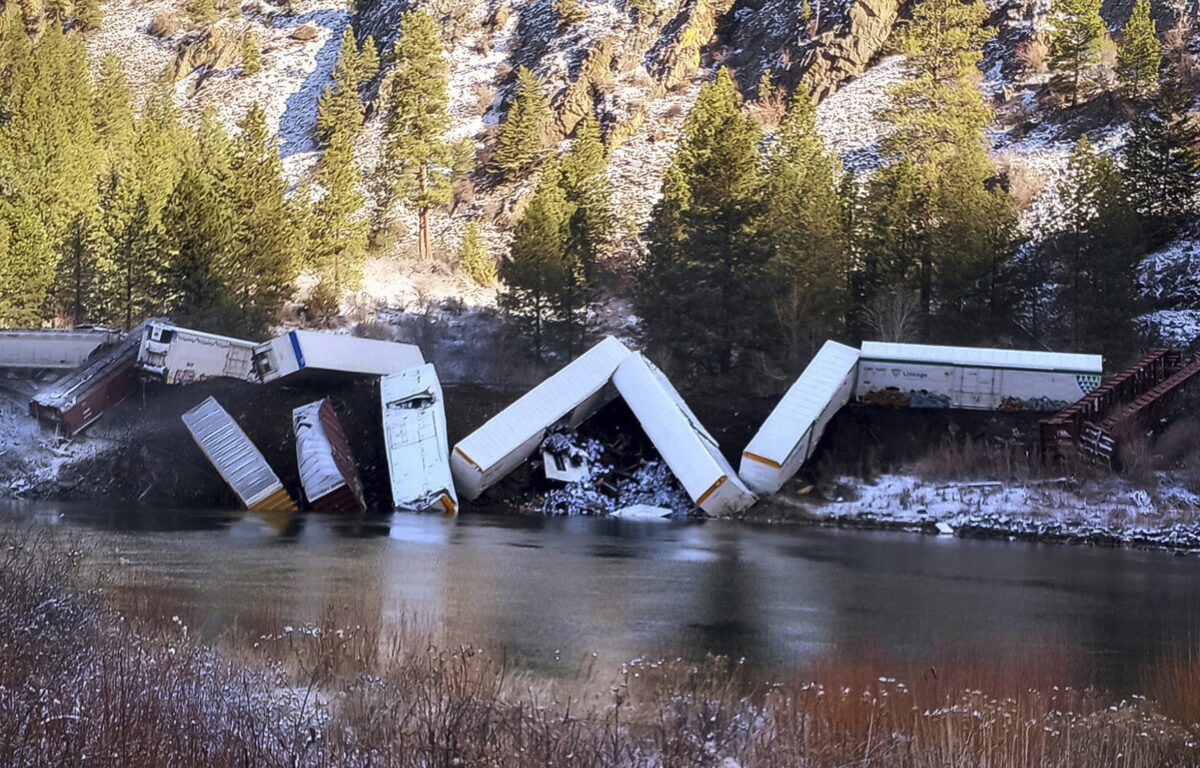


A train that derailed near the town of Paradise in western Montana on Sunday morning has been cleared of any environmental hazards and injuries after it triggered an emergency response with witnesses reporting carriages entering a nearby waterway.
Upon news of the derailment, first responders, rail owner Montana Rail Link (MRL), and local leaders worked to quickly determine whether any hazardous substances were onboard the train after reports that a train had derailed at a site along the Clark Fork River just west of Paradise around 9:20 a.m.
State Gov. Greg Gianforte responded to initial reports of the derailment on Twitter, saying, “I was briefed this morning on the train derailment in Sanders County, and we are prepared to mobilize the state’s resources.”
The Sanders County Sheriff’s Office told local outlet KPAX that clay-like powder could be seen coming from some of the carriages that contained what appeared to be cans of food and clay. One of the cars was reportedly refrigerated.
Paradise Rural Fire District has since confirmed that while substances had been spilled into the local waterway in the 25-car derailment, no hazardous chemicals were involved.
The Fire District, which was among the first to respond, said in a press release on Sunday night that alongside St. Regis Fire and a Plains Community Ambulance, they sent 13 firefighters and six apparatuses to the crash site.
It said that MRL employees could quickly assess the damage from the derailed carriages and concluded there was no danger to the public or railway employees at the spill site. No one was injured in the derailment, and Paradise residents were told they were safe.
After a more thorough assessment, which included air, soil, and water monitoring, any potential environmental concerns at the site were ruled out.
“The railcars that reached the river were empty or carrying Coors Light and Blue Moon,” it said, adding, “This is not floating down the river and is secured in the derailment area,” in an apparent attempt to prevent people visiting the spill site in search of beer.
One carriage known by MRL to be carrying butane was the company’s primary concern. However, it was found only partially derailed and was not leaking.
“Visual inspection and utilizing a gas meter did not detect any leaks,” the statement read.
Local authorities ordered people staying in cabins at a hot spring resort just across the river from the derailment site to evacuate as a precaution.
Guests at Quinn’s Hot Springs Resort posted video of the derailment on Twitter.
Quinn’s general manager Denise Moreth told the Missoulian that reception staff described a “loud, rumbling crash, and then they heard the train derailment.”
She said this is the first derailment she has seen after two decades at Quinn’s, which usually has around four to five trains pass through daily.
Video of the derailment site from CBS affiliate KENS5 showed hundreds of cases of beer spilled from the railcars. KENS5 reported a timeline for the cleanup efforts has not yet been set.
“Over the following days and weeks, we will be working with MRL while they clean up and rebuild the track,” the Fire District said.
“We are committed to addressing any impacts to the area as a result of this accident, prioritizing the safety of our employees and the public, and understanding the reasons for this incident,” an MRL spokesman said in a statement.
The cause of the derailment remains unclear. The Epoch Times has contacted MRL for comment.
The toxic train derailment in East Palestine, Ohio, in February, triggered renewed attention to railway safety nationwide.
Since the East Palestine tragedy, numerous other train derailments have left residents near railways concerned over whether safety measures are adequate to protect them from another spill involving hazardous chemicals.
According to data from the Federal Railroad Administration, 1,173 train derailments were reported across the country last year.
The American Association of Railroads (AAR), which represents the major freight railroads like Amtrak and others, said that the data showed that railway accidents are down 28 percent since 2000.
“Last month, we all saw the devastating impact a train derailment can have on a community, and we are committed to continuing our industry’s efforts to prevent what happened in East Palestine from happening elsewhere,” AAR President and CEO Ian Jefferies said in a statement.
“This data makes clear that our employees’ strong safety culture, paired with the sustained, disciplined investments in maintenance and technologies that target the primary causes of accidents, deliver meaningful safety results.
“There is more work to do, but FRA’s data clearly reflects railroads’ steadfast safety commitment.”
